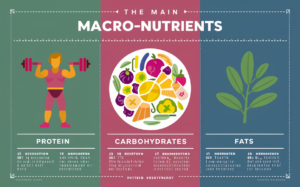Starting a fitness journey is a significant milestone towards improved health and well-being. For busy professionals, the challenge often lies in integrating effective nutrition and exercise into an already packed schedule. This nutrition guide is designed not just for fitness novices but also for the time-pressed worker, offering tailored advice to help you fuel your workouts, nourish your body, and sustain your energy levels throughout your demanding day.
Why Nutrition Matters for Fitness
Think of food as your workout fuel. What you eat directly impacts:
- Energy levels: Balanced meals keep you powered through your workouts.
- Muscle building & recovery: The right nutrients help repair and grow muscles.
- Overall well-being: Good nutrition supports your fitness journey and overall health.
Understanding Macronutrients:

Macronutrients, commonly referred to as “macros,” are nutrients your body requires in large amounts in order to function correctly and provide energy and fuel various bodily processes. There are three major classes of macronutrients:
1. Proteins: The Muscle Mavericks
Proteins are crucial for repairing and building muscle tissue, especially important if your fitness routine includes strength training. Furthermore, it contributes to healthy bones, skin, enzyme function, hormone production, and immune system health.
Opt for easy-to-prepare or ready-to-eat sources like rotisserie chicken, canned beans, Greek yogurt, legumes, nuts, and seeds or a high-quality protein powder that can be quickly mixed into a smoothie. If you prefer vegan diet, there are lots of Vegan Protein Sources for Muscle Building.
Tip: Keep hard-boiled eggs or single-serve cottage cheese packs in your fridge for a protein-rich snack that’s grab-and-go.
2. Carbohydrates: The Energy Engines
Carbohydrates (Carbs) provide our bodies with energy through glucose. Once digested into our bloodstreams and blood vessels, this energy source can then be utilized by cells as fuel for fueling purposes. There are two primary forms of carbohydrates: starches and sugars.
Simple carbohydrates: Found in sugary foods and beverages tend to be digested quickly, leading to sudden blood sugar spikes.
Complex carbohydrates: Found in whole grains, vegetables, and fruits, these are digested slower and provide sustained energy.
Tip: Overnight oats or whole-grain wraps are versatile options that can accommodate a variety of fillings and flavors, ensuring you don’t get bored.
3. Fats: The Nutrient Navigators
Contrary to popular belief, healthy fats are integral components of a balanced diet. They provide energy and support cell function while aiding in vitamin absorption. There are various kinds of healthy fats; here are a few:
- Saturated fats: Found in animal products and some processed foods, these should be consumed in moderation.
- Unsaturated fats: Found in vegetable oils, nuts, seeds, and avocados, these are beneficial for heart health.
- Trans fats: Found in processed foods, these should be avoided as they contribute to heart disease.
Tip: Pack single-serve packets of nut butter or have a small container of mixed nuts at your desk for a quick, healthy fat boost.
Hydration: Your Daily Performance Enhancer
Water is crucial, not just for physical performance but for cognitive function as well. Busy professionals should keep a water bottle at their desk to ensure they’re drinking regularly. Consider setting reminders on your phone or computer to take hydration breaks.
Meal Timing: Maximizing Nutrition with a Hectic Schedule
Pre-Workout: A light snack that includes carbohydrates and a bit of protein can provide the needed energy without weighing you down. A banana with a spoonful of almond butter is a perfect example.
Post-Workout: It’s crucial to refuel with a blend of carbs and protein to aid recovery. For those short on time, a protein shake or a Greek yogurt with granola can be effective and efficient choices.
Smart Snacking for Sustained Energy

Professionals on the go need nutritious snacks at their disposal to avoid energy dips and unnecessary vending machine visits. Pack snacks that provide protein, healthy fats, and fiber, such as whole-grain crackers with hummus or mixed nuts and dried fruit in small bags, which may keep their energy up during their busy days.
Quick and Nutritious Meal Ideas:
Breakfast:
- Overnight oats with chia seeds, almond milk, and berries can be prepped in advance.
- Whole-wheat toast with eggs and avocado
Lunch:
- Quinoa salad with mixed vegetables, feta cheese, and grilled chicken can be made in bulk and eaten throughout the week.
- Lentil soup with a whole-grain roll
Dinner:
- Stir-fried tofu or shrimp with a variety of vegetables over brown rice is quick, nutritious, and satisfying.
- Greek yogurt with berries
- Hummus and veggie sticks
Supplements: A Helping Hand

Though real food should always be the top priority, supplements like multivitamins or omega-3 fatty acids may fill in any gaps in nutritional intake. Busy professionals may find a daily multivitamin or protein supplement useful, although it’s wise to consult with their healthcare provider first before making such decisions.
FAQs:
Q: How can I fit workouts into my hectic schedule?
Opt for high-intensity interval training (HIIT) sessions that can be done in 20-30 minutes. Consider walking meetings or using a standing desk to stay active.
Q: What are the best foods for energy during long workdays?
Focus on complex carbohydrates and lean proteins for sustained energy. Foods like oatmeal, almonds, and turkey sandwiches on whole-grain bread are excellent choices.
Q: How can I stay hydrated if I keep forgetting to drink water?
Keep a water bottle visible at all times, and set reminders on your phone. Try flavoring your water with fruits or cucumber to make it more appealing.
Bottom-line:
For busy professionals embarking on a fitness journey, integrating smart nutrition and efficient workouts into your daily routine can significantly enhance your health and productivity. By focusing on balanced, convenient meal options and staying hydrated, you can maintain high energy levels, improve your physical fitness, and manage your busy schedule effectively. Remember, consistency and planning are key to fitting health and fitness into a demanding lifestyle.
